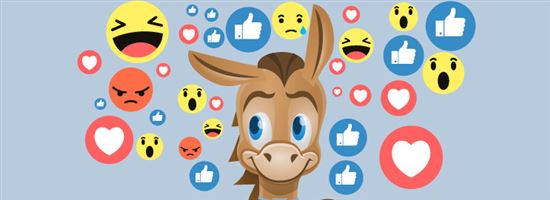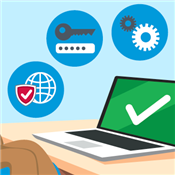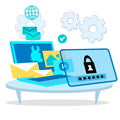Negative Effects of Social Media
According to the University of Chicago, social media is more addicting than cigarettes. Does this mean you should you steer clear of social media, or is there a way to use it without experiencing the negative side effects?
 |
| © CreditDonkey |
The Damage That Social Media Causes
What Are The Top Negative Effects Of Social Media?
Social media is addicting; in fact, it's more addicting than cigarettes. The addiction can lead to a variety of issues, including general anxiety, social anxiety, lack of self-confidence, and even obsessive-compulsive disorder.
What Does Social Media Do To Your Brain?
Whether you realize it or not, social media affects the way you feel. A study, conducted strictly on Facebook, followed how one negative post affects others who read it. The study found that for each negative post made, the readers then created an average of 1.29 negative posts themselves.
Does Social Media Cause Anxiety?
Social media can cause what's called social media anxiety disorder. This occurs when a person is unable to check their social media accounts often. For some, the anxiety can kick in after just a few minutes, while others don't feel it until it's been a few hours. Either way, it causes unsettling feelings and can disrupt one's normal life.
Does Social Media Cause Depression?
Studies show that users with "heavy use" of social media have between a 13% and 66% higher chance of being depressed. This could be due to the lack of "real-life" relationships users are making. The online relationship doesn't have the same emotional satisfaction that you can get with real-life relationships.
Can Social Media Make You Lonely?
Whether or not social media can make you lonely depends on who you ask. Some experts state that social media is actually a good way for those with anxiety not produced by social media to communicate with people in their life. Communicating behind a screen can help a person with anxiety feel better and less lonely.
What Are The Non-health Related Risks Of Social Media?
It's not all physical or mental effects that can occur as a result of social media use. Children especially are also prone to:
- Bullying
- Exposure to inappropriate material
- Higher risk of identity theft or fraud
- Risk of becoming a victim of online pressures (grooming, kidnapping)
What Are The Physical Side Effects Of Social Media?
Users who spend too much time on social media sites tend to experience one or more of the following physical side effects:
- Back issues
- Neck issues
- Eye strain
- Obesity
- Risk of cardiovascular issues
What Is FOMO?
FOMO stands for the "fear of missing out." It happens most often with social media, as users are able to see what others are doing or how glamorous other lives are, making a person feel like they are missing out on the fun.
Social Media and Academics
Does Social Media Affect Academic Performance?
There's the obvious risk that social media use poses to academic performance based on the amount of time/focus people place on social media. Social media also affects a person's use of the English language, with shorthand and acronyms used more often than proper grammar.
Is Social Media Important For Students?
Students can argue that social media is important for them, especially as they enter college. Because social media is a large part of doing business in the "real world," students can have an advantage when they leave school and start their first job. In other words, it provides the opportunity for interaction and unique learning.
How Many College Students Use Social Media?
A shocking 98% of college students ages 18-24 years old use social media, according to a study conducted by Experian Simmons.
Which Social Media Platform Do College Students Use The Most?
The most popular social media apps used by college students today are Instagram and Snapchat. In fact, 78% of college students ages 18-24 years old use Snapchat today.
Social Media and How It's Used
How Many Teens Use Social Media?
A shocking 9 out of 10 teens use at least one social media app. Even more shocking, more than 70% of teens use more than one social media app.
What Is The Average Age Of A Social Media User?
Studies show that 69% of the public uses some type of social media—that's a 64% increase since 2005. While young adults are the most common social media users, adults ages 65 and over use it too. 88% of young adults ages 18-24 use social media, whereas 37% of those ages 65 and over use it.
How Many Hours Does The Average Person Use Social Media?
The average person uses social media for an average of 2+ hours per day. This could be a result of the number of social media accounts the average person has today, as that number has doubled since 2012. Putting this into perspective, 2 hours a day equals 5 years and 4 months over the average lifetime.
What Is The Most Used Social Media Platform By Teens?
Just like college students, the most popular social media apps for teens are Instagram and Snapchat. 76% of teens use Instagram and 75% of teens use Snapchat.
Is Snapchat More Popular Than Instagram For Teens?
It's a close race for Instagram and Snapchat, but Instagram comes out on the top in the eyes of teens. 85% of teens use Instagram and 84% of teens use Snapchat.
What Is The Most Used Social Media Platform By Adults?
Adults by far tend to use Facebook much more than any of the other social media app today, although YouTube actually surpassed Facebook as far as popularity.
What Age Group Uses Snapchat The Most?
It probably goes without saying that teens monopolize the use of Snapchat, but they aren't the only users. 31% of adults ages 25-34 use Snapchat, as do 8% of those ages 35 and older.
Getting Help for Social Media Use
How Can You Use Social Media Less?
It might be easier said than done to quit your social media habit, but here are a few simple ways you can cut down your use:
- Set specific times of day that you can check your social media accounts
- Set a time limit that you can stay in your social media account
- Make your password something that is hard to remember (to make it harder to log in)
- Focus on your "real-life" obligations
- Turn your notifications off so that you don't know when something new has occurred
How Much Time Should You Spend On Social Media A Day?
Experts suggest limiting your social media use to just 30 minutes per day for the least amount of mental health side effects as a result of too much social media use.
How Can You Stay Safe On Social Media?
If you have a social media account, you put yourself at risk for a variety of issues, including identity theft. In order to avoid it, use some or all of the following tips:
- Use strong passwords
- Change your password at least once a month
- Set up two-factor authentication whenever possible
- Don't share your passwords
- Don't set up automatic login on your mobile phone or tablet
- Only friend people that you actually know
Bottom Line
Social media can have a negative impact on your life. It's important to understand your own limits and learn when to take a break.
Social Media and Your Brain
Does Social Media Cause Anxiety?
Social Media and Depression
College Social Media Statistics
College Social Media Platform Statistics
Teen Social Media Statistics
General Social Media Statistics
Hours Spent in Social Media
Most Used Platform
Most Used Platform by Adults
Social Media Age
How Much Time You Should Spend on Social Media
Write to Kim P at feedback@creditdonkey.com. Follow us on Twitter and Facebook for our latest posts.
Note: This website is made possible through financial relationships with some of the products and services mentioned on this site. We may receive compensation if you shop through links in our content. You do not have to use our links, but you help support CreditDonkey if you do.
Read Next:






